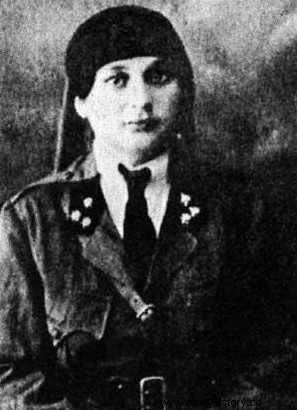Feminist and separatist, Naziq al-Abid (1887 – 1959) was a pioneer in the struggle for independence and for women’s rights in Syria.
Activist from a wealthy family

Naziq Khatim al-ʿAbid Bayhum was born in 1887 to a wealthy family in Damascus, Syria, then part of the Ottoman Empire. Noble, his father was a member of the court of the Sultan of the Ottoman Empire Abdulhamid II; Naziq's uncle is an adviser to the sultan. The little girl had a luxurious childhood and benefited from a quality education.
Quickly, however, his conscience awakens against inequalities and injustices. The privileges that she owes to the wealth of her family displease her, just as she is repelled by gender inequalities or the domination of the Ottoman Empire. Sometimes nicknamed “the rebel”, she shocks with her opinions and her committed, social or feminist actions; determined to work, she notably discards her rich finery for practical work clothes.
The battle for independence
Naziq al-Abid studied in Istanbul, where she received instruction in several languages in Turkish, American and French schools. During her studies, the young girl's commitment against the discrimination practiced against Arab students earned her to be sent back to Syria. Subsequently, for having created an association for the defense of women's rights, she was sent to Cairo; it will remain there until the fall of the Ottoman Empire, at the end of the First World War in 1918.
The Ottoman Empire was then dismantled between European powers, and Syria occupied by French troops. Despite this control, Syrian nationalists unilaterally proclaimed the country's independence in March 1920, in the form of a constitutional monarchy in the hands of Prince Faisal. A month later, the San Remo International Conference reaffirmed French control of Syria and Lebanon, in the form of a League of Nations mandate. Faisal decides not to fight, but his defense minister, Youssef al-Azmeh, refuses to surrender. Naziq then takes up arms to fight for the independence of Syria.
In July 1920, the Battle of Khan Mayssaloun turned into a disaster for the Syrian separatists, and confirmed France's domination of the territory. Naziq participates in it; she is at the head of a battalion of nurses from an association she has just created, the Red Star, inspired by the Red Cross. She survives the battle, and earns the title of general of the Syrian army. His participation in the fight also earned him exile by the French, to Lebanon and then to Jordan; granted amnesty on condition that she give up politics, she returned to Syria the following year.
Feminist commitments
Naziq al-Abid's fight for independence is coupled with a fight for women's rights; she is committed, in particular, to women's right to vote, which she has been calling for since 1920. Upon her return to Syria, she founded the association La Lumière de Damas (Nur al-Fayha) , which aims to promote the learning of Arab culture in girls' schools, coupled with a feminist newspaper. For fear of the French authorities, she took refuge in Lebanon for a time before returning to Syria.
Upon his return in 1922, Naziq met and married Syrian politician and intellectual Muhammad Jamil Bayhum. Her husband supports her and assists her in her feminist commitments, in particular in favor of women's right to vote. The same year, Naziq co-founded with Adile al-Jazairi and others the association The Awakening of the Women of Damascus , dedicated to social works such as sewing or English lessons for poor girls. In parallel with its fight for women's right to vote, Naziq is indeed committed to women's economic rights, workers' rights, day of rest or maternity leave in particular.
A tireless activist, Naziq set up numerous mutual aid and support networks, in particular for women workers in 1933; some of her demands are successful, such as the establishment of maternity leave. Victories that, in part thanks to the involvement of Naziq and other activists, continued after 1943 and the end of the French mandate in Syria. During the 1948 Arab-Israeli War, Naziq created an association to help Palestinian refugees.
She died in Damascus in 1959.
